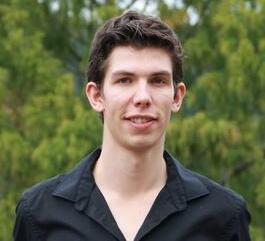James A. Maynard facts for kids
Quick facts for kids
James Maynard
|
|
|---|---|

Maynard in 2013
|
|
| Born |
James Alexander Maynard
10 June 1987 Chelmsford, Essex, England
|
| Alma mater |
|
| Known for | Work on prime gaps |
| Awards |
|
| Scientific career | |
| Fields | Number theory |
| Institutions |
|
| Thesis | Topics in analytic number theory (2013) |
| Doctoral advisor | Roger Heath-Brown |
James Alexander Maynard (born 10 June 1987) is a famous English mathematician. He works on a part of math called analytic number theory. This field helps us understand prime numbers. In 2017, he became a Research Professor at the University of Oxford. He is also a fellow at St John's College, Oxford. James Maynard won the important Fields Medal in 2022. He also received the New Horizons in Mathematics Prize in 2023.
Early Life and Education
James Maynard grew up in Chelmsford, England. He went to King Edward VI Grammar School, Chelmsford. After school, he studied at Queens' College, Cambridge. There, he earned his bachelor's and master's degrees in 2009.
He then went to Balliol College, Oxford. In 2013, he earned his D.Phil. degree. This is a very high-level degree, like a PhD. His teacher was Roger Heath-Brown. After that, he became a Fellow at Magdalen College, Oxford.
Amazing Discoveries
In 2013, James Maynard made a big breakthrough. He found a new way to prove something about primes. This was about "bounded gaps" between prime numbers. Imagine prime numbers like 2, 3, 5, 7, 11. The "gap" is the space between them. For example, the gap between 3 and 5 is 2.
Maynard showed that there are always prime numbers that are close to each other. He proved that there are endless pairs of primes with a gap of 600 or less. This was a big improvement on earlier work. Other mathematicians then worked together to make this gap even smaller. They reduced it to 246.
In 2014, Maynard solved another old math problem. This one was about finding very large gaps between prime numbers. For this work, he received a special prize of $10,000.
He also showed something cool about numbers in 2016. He proved that there are endless prime numbers that do not use a certain digit. For example, there are many primes that don't have the digit '7' in them.
In 2019, he worked with Dimitris Koukoulopoulos. Together, they proved the Duffin–Schaeffer conjecture. This was another long-standing problem in number theory.
In 2022, James Maynard received the Fields Medal. This is one of the highest awards a mathematician can get. He earned it for his work on prime numbers. His discoveries helped us understand how prime numbers are structured.
Awards and Recognition
James Maynard has won many important awards for his work:
- SASTRA Ramanujan Prize (2014)
- Whitehead Prize (2015)
- EMS Prize (2016)
- Cole Prize (2020)
- Fields Medal (2022)
- New Horizons in Mathematics Prize (2023)
- Fellow of the Royal Society (2023)
Being a Fellow of the Royal Society means he is recognized as one of the best scientists in the United Kingdom.
Personal Life
James Maynard was born on June 10, 1987. He was born in Chelmsford, England. His partner is Eleanor Grant, who is a medical doctor. They have a son together.
 | Sharif Bey |
 | Hale Woodruff |
 | Richmond Barthé |
 | Purvis Young |

